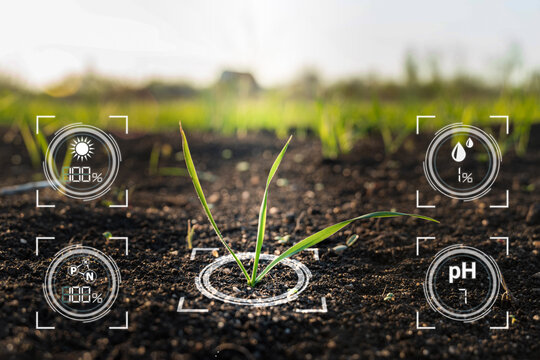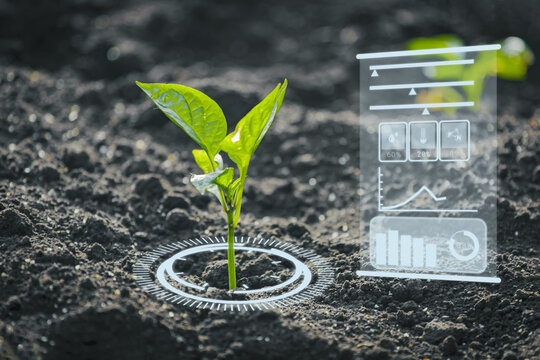In an era where global food security is paramount, the integration of artificial intelligence (AI) in agriculture has emerged as a game-changer, revolutionizing the way we cultivate crops, monitor fields, and predict yields. From precision farming and crop monitoring to yield prediction and resource optimization, AI-driven technologies offer invaluable insights and tools that empower farmers to increase productivity, reduce resource waste, and sustainably feed a growing population. In this blog, we'll explore the diverse applications of AI in agriculture, highlighting its benefits, capabilities, and potential for transforming the agricultural industry and ensuring food security for generations to come.
Enhancing Communication: Facilitating Dialogue with Natural Language Generation in Agricultural Decision-Making
Natural language generation (NLG) emerges as a transformative tool in agriculture, facilitating seamless communication between farmers and AI-driven decision support systems. NLG algorithms analyze vast agricultural datasets, weather forecasts, and market trends to generate dynamic and contextually relevant communications. These NLG-powered systems offer personalized recommendations for crop management, deliver market insights for pricing decisions, and engage with farmers on sustainability initiatives. By simulating natural language patterns and expressions, NLG enables AI systems to communicate complex information in a clear and understandable manner, empowering farmers to make informed decisions that optimize productivity, profitability, and sustainability on the farm. As AI continues to advance, the integration of NLG in agricultural decision-making holds the promise of unlocking new levels of engagement, transparency, and impact in the way we produce and manage food resources.
Driving Innovation: Empowering Agriculture with Skilled App Developers
In the agricultural sector, skilled hire app developer play a crucial role in driving innovation and enhancing the functionality of AI-driven decision support systems. Collaborating with agricultural experts, AI engineers, and data scientists, these developers design and implement user-friendly mobile applications that enable farmers to access real-time data, receive personalized recommendations, and optimize farm management practices. Leveraging their expertise in software development and user interface design, app developers ensure that agricultural apps offer intuitive navigation, responsive features, and a seamless user experience. Furthermore, they integrate advanced functionalities such as data visualization and predictive analytics into decision support platforms, enhancing their capabilities and value proposition for farmers. Through their creativity and technical proficiency, app developers contribute to the continuous improvement and evolution of agricultural technologies, empowering farmers to make data-driven decisions that enhance efficiency, productivity, and sustainability on the farm.
Ensuring Data Accuracy: Enhancing Agricultural Technologies with Data Annotation Specialists
Data annotation specialists play a crucial role in the agricultural sector by ensuring the accuracy and reliability of AI-driven decision support systems. These specialists meticulously label and annotate vast agricultural datasets, including satellite imagery, sensor data, and crop health information. By annotating data with relevant tags and labels, data annotation specialist enable AI algorithms to learn and make informed decisions, ultimately improving the performance and effectiveness of agricultural technologies. Working closely with agricultural experts and AI engineers, they identify and mitigate biases in the data, ensuring that decision support systems provide unbiased and inclusive insights for farmers. Through their expertise and attention to detail, data annotation specialists contribute to the continuous enhancement and optimization of agricultural technologies, empowering farmers to make informed decisions that optimize productivity, profitability, and sustainability on the farm.

Precision Farming: Maximizing Efficiency and Sustainability
Precision farming, also known as precision agriculture, harnesses AI and advanced technologies to optimize farming practices and maximize crop yields while minimizing inputs such as water, fertilizer, and pesticides. AI algorithms analyze data from satellite imagery, drones, and sensors to create detailed maps of fields, identifying variability in soil conditions, moisture levels, and crop health. By leveraging this information, farmers can implement site-specific management strategies, such as variable rate irrigation and precision seeding, to optimize resource use and improve crop productivity. Moreover, AI-driven decision support systems provide real-time recommendations for planting, fertilizing, and pest management, enabling farmers to make data-driven decisions that enhance efficiency and sustainability on the farm.
Crop Monitoring: Detecting Pests, Diseases, and Nutrient Deficiencies
Crop monitoring is a crucial aspect of modern agriculture, allowing farmers to detect and address pests, diseases, and nutrient deficiencies before they impact crop yields. AI-powered monitoring systems analyze imagery and sensor data to identify anomalies in crop growth and health, such as pest infestations, fungal infections, and nutrient imbalances. By detecting these issues early, farmers can take timely action to mitigate damage and preserve crop yields. Moreover, AI algorithms can predict crop stress and yield potential based on environmental factors such as temperature, precipitation, and soil moisture, enabling farmers to anticipate challenges and optimize management practices accordingly. Through continuous monitoring and analysis, AI empowers farmers to maintain healthy crops and maximize productivity throughout the growing season.
Yield Prediction: Anticipating Harvests and Market Trends
Yield prediction is essential for farm planning, market forecasting, and risk management. AI algorithms leverage historical yield data, weather patterns, and crop characteristics to generate accurate predictions of future harvests. By analyzing vast datasets and incorporating machine learning techniques, AI models can account for complex interactions between environmental factors, crop genetics, and agronomic practices, yielding precise and reliable forecasts. These predictions enable farmers to make informed decisions about planting schedules, input purchases, and marketing strategies, optimizing profitability and reducing financial risks. Moreover, yield prediction models provide valuable insights for policymakers, commodity traders, and food security organizations, facilitating informed decision-making and ensuring stable food supplies in a volatile market environment.
User Value: Empowering Farmers with Actionable Insights and Decision Support
For farmers, the value proposition of AI in agriculture is clear. These technologies offer actionable insights, decision support, and predictive analytics that empower farmers to optimize farm management practices, increase productivity, and mitigate risks. By harnessing the power of AI, farmers can make data-driven decisions that enhance efficiency, sustainability, and profitability on the farm. Moreover, AI-driven solutions enable farmers to adapt to changing environmental conditions, market trends, and regulatory requirements, ensuring resilience and competitiveness in an increasingly complex agricultural landscape. Ultimately, AI in agriculture not only enhances individual farm operations but also contributes to global food security, sustainability, and economic development, ensuring a brighter future for farmers and consumers alike.
Conclusion: Embracing the Future of Agriculture with AI
In conclusion, the integration of AI in agriculture represents a transformative shift in the way we produce food, manage resources, and sustainably feed a growing population. By harnessing the power of AI-driven technologies such as precision farming, crop monitoring, and yield prediction, farmers can unlock new levels of efficiency, productivity, and resilience on the farm. As we continue to innovate and advance AI solutions for agriculture, the potential for positive impact on food security, environmental sustainability, and economic prosperity is immense. By embracing AI as a tool for positive change, we can build a more resilient, efficient, and sustainable agricultural system that nourishes people and planet for generations to come.


